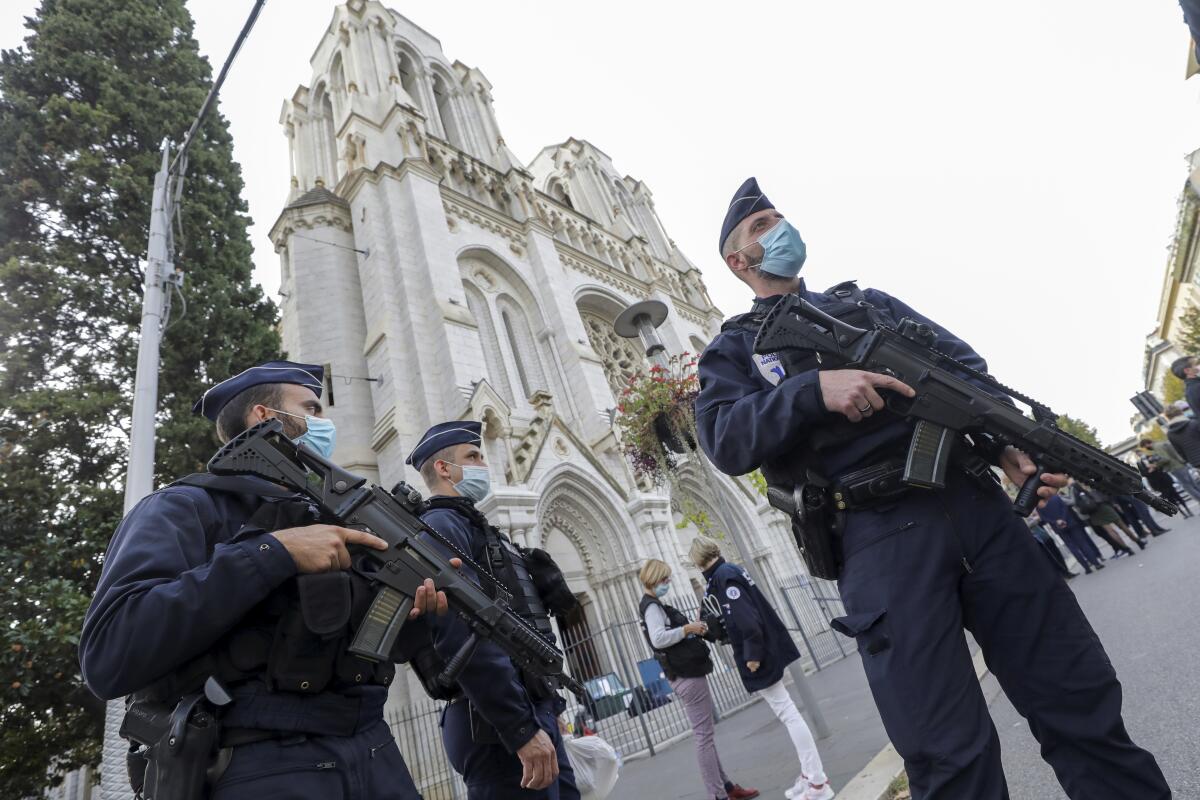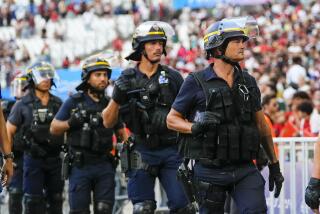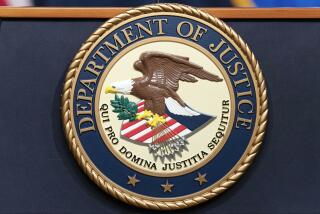Second suspect arrested in terrorist attack at church in southern France

A second suspect was in custody Friday in the investigation into a gruesome attack that killed three people in a French church, as France heightened its security alert amid religious and geopolitical tensions stemming from caricatures of the prophet Muhammad.
The new suspect is a 47-year-old man believed to have been in contact with the assailant the night before Thursday’s knife attack at the Notre Dame Church in Nice, on the French Riviera, according to a judicial official. The official was not authorized to be publicly named.
The alleged attacker, Ibrahim Issaoui of Tunisia, was seriously wounded by police and hospitalized with life-threatening injuries, authorities said. Anti-terrorism prosecutors in France and Tunisia are investigating.
Two women and a man inside the church were killed in the attack — the third that French authorities have attributed to Islamic extremists in less than two months. French media identified two of the victims as Vincent Loques, a 55-year-old father of two who was the church’s sacristan, and a 44-year-old Brazilian woman named Simone, who had studied cooking in Nice and helped poor communities.
In an interview broadcast Friday with Saudi-owned Al Arabiya TV, Issaoui’s mother said she was shocked by the events.
From the Tunisian province of Sfax, the mother, her eyes wet with tears, said she was surprised to hear her son was in France when he called upon his arrival, and she had no idea what he was planning. “You don’t know the French language, you don’t know anyone there, you’re going to live alone there, why, why did you go there?” she said she told him over the phone.
The French government promised to protect France’s Jewish community from extremists after a double stabbing in Paris blamed on Islamic terrorism.
Issaoui’s brother told Al Arabiya that Issaoui had informed the family he would sleep in front of the church and sent them a photograph showing him at the cathedral where the attack took place. “He didn’t tell me anything,” the brother said.
A neighbor said that he knew Issaoui when he was a mechanic and held various other odd jobs, and that he had shown no signs of radicalization.
France’s anti-terrorism prosecutor said Issaoui, who is 30 or 31, reached the Italian island of Lampedusa, a key landing point for migrants crossing in boats from North Africa, on Sept. 20 and traveled to Bari, a port city in southern Italy, on Oct. 9. It is not clear when he arrived in Nice.
Tunisians fleeing a coronavirus-battered economy make up the largest contingent of migrants landing in Italy this year. Italian media reported that Issaoui was one of 1,300 arriving migrants who arrived Sept. 20 on Lampedusa. He was then placed with 800 others on a coronavirus quarantine boat in Puglia.
News Alerts
Get breaking news, investigations, analysis and more signature journalism from the Los Angeles Times in your inbox.
You may occasionally receive promotional content from the Los Angeles Times.
After the two-week quarantine, he received a notice that he was being expelled from Italy for illegal entry and was given seven days to leave the country, according to Milan daily Corriere della Sera.
Italy’s interior minister confirmed Friday that Issaoui was ordered to leave Italy on Oct. 9. The minister, Luciana Lamorgese, did not give further details on what, if any action, was taken to ensure that he complied with the order, but she said he was not flagged by either Tunisian authorities nor by intelligence agencies.
Nice was the scene of a major terrorist attack four years ago when a man drove a heavy truck at high speed through Bastille Day revelers massed along the seafront, killing dozens of people.
Besides the knife attack in Nice, France was shocked this month by the beheading of a teacher who had shown caricatures of Muhammad in class after the cartoons were re-published by satirical newspaper Charlie Hebdo.
President Emmanuel Macron said he would immediately increase the number of soldiers deployed to protect schools and religious sites, upping the total from about 3,000 to 7,000.
More to Read
Sign up for Essential California
The most important California stories and recommendations in your inbox every morning.
You may occasionally receive promotional content from the Los Angeles Times.










